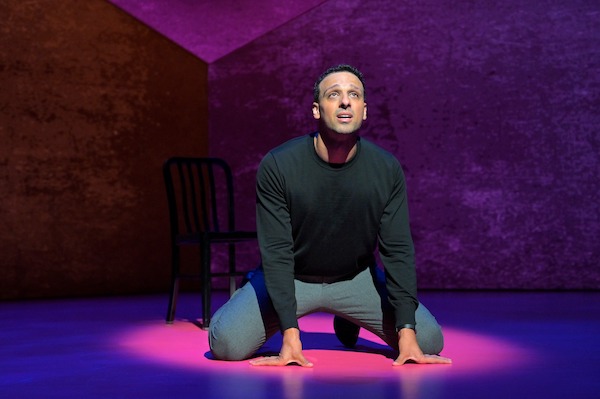
“My dream would be if everything in the world could take place in a steam room,” jokes tall, dark and handsome Ari’el Stachel in “Out of Character,” his one-man theatrical memoir, directed by Tony Taccone in its debut production at the Berkeley Rep through July 30.
Whoa, nellies! Before you start making wishful assumptions, you should know that Stachel’s fantasy springs from the fact that he has a chronic anxiety disorder which causes him to perspire torrentially in stressful situations.
To judge from the droplets of sweat that fall from his face throughout this very funny but ultimately unsettling 80 minute self-examination, performing itself is one of those situations.
At one point, Stachel, says in passing, that being on stage is the one place he feels comfortable. But, at much greater length, he reenacts having a panic attack onstage on Broadway, then self-medicating with alcohol in his dressing room to avoid reoccurences.
“Out of Character” is drenched in its creator’s confusion.
Acting and angst
In the show’s opening scene, Stachel, a Berkeley native, revisits the the 2018 Tony awards, where he won Best Featured Actor for his Broadway debut in “The Band’s Visit,” which is set in Egypt. On that occasion, he spoke movingly of the discomfort he felt about his Middle Eastern heritage beginning in the wake of 9/11, when he was 10 years old.
But the show flashes back to crises even earlier in Stachel’s life. At age 5, in the wake of his parents’ divorce, he begins hearing an inner voice that insists he enact a series of repetitive behaviors to prevent the world from being smothered in molten lava.
The first of several therapists that Stachel mimics over the course of the evening diagnoses him with Obsessive Compulsive Disorder and puts him on medication.
Years later, following the attack on the Twin Towers, schoolyard bullies tease Stachel for his dark skin (also his “girl’s name,” taunting him as “Ari’el, the little mermaid”).
When classmates and their parents encounter Stachel’s father, a thick bearded Yemenite, they distance themselves and whisper “Bin Laden.” (It’s confounding that young Stachel never tells his tormentors that his father is Jewish—a major gap in his script).
Soon enough, Stachel starts to avoid being seen with his father in public, while simultaneously filling a reservoir of shame over his behavior. That persistent inner voice (apparently impervious to treatment) switches its threats from cataclysmic lava to terrorist attacks.
In several tour de force comic scenes that make the most of his elastic face and expressive voice, Stachel presents the alternate personae he took on as he transferred between schools and social scenes. He tries on the guise of a a white Orinda skater boy, then slips into a hoop-shooting black crowd.
Eventually he lands at the Oakland School for the Arts, where acting gives him both much-needed focus and what, in retrospect, feels like a rationale to avoid addressing a painfully unstable sense of self.
That instability is complex and multi-layered. It didn’t start with the Stachel’s secondary school code switching, but with the emotional and biochemical challenges he faced as a small child. And, as “Out of Character” goes on to make clear, it isn’t healed through his successes in drama school and a still-young acting career.
Stachel’s self-analysis is clearly a work in progress. Consequentially, so is “Out of Character.”
For Stachel’s terrific performance and frank, funny writing, this is a show I recommend seeing in its current run. But I hope it’s not polished and remounted. The rest of the work should be done off stage.
